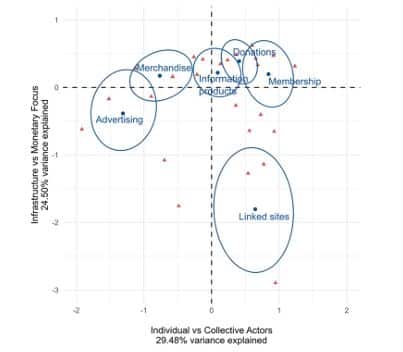Next time I hear someone bemoan academics becoming more and more deeply involved in smaller and smaller subjects, I’ll point them to this little gem of a paper: “The political economy of digital profiteering,” by researchers at Oxford University’s “Internet Institute.” Put simply, the researchers studied how anti-vaxx influencers make money.
They focused on documenting not just websites and social media pages, but also their interconnections. Using the Google IDs embedded in the code required by Google Adsense, they could see which websites were linked to the same Google IDs. By using plug-ins WhatRuns and Wappalyzer they could also see which sites ran content from each other.
We all know the standard internet operating model is that clicks make money. Views lead to clicks for a website’s Google ads and clicks are paid; one ad click could be worth 15 cents to the website owner, with a typical range between 10 cents and $1.
The Oxford researchers, however, found that the role of advertising has been overemphasised. In one sense, anti-vaxxers operate more like other radical social movements. About half seek donations and membership sign-ups, presenting their activities as charitable and other times just asking for support to keep websites going.
But secondly, they profit by selling higher-value content than just clicks. A third of anti-vaxx websites and online presences sell books cataloguing their claims, with titles like “medical kidnapping” and “vaccine epidemic.”
But the major mechanism for monetization was clustering, with sites like ‘Vaccine Impacts’ and ‘Healthy Traditions’ run by the same people. The anti-vaxx stories are essentially a draw to build a potential audience for nutritional supplements.
“If you’ve been vaccinated and suffer from serious vaccination damage, you’re best off living a lifestyle that promotes detoxification for the rest of your life,” says one “organic lifestyle” website. “The truth is, you may never be able to dispel all of the toxins that have caused the damage.”

The movement’s major figures float on top of this system. Like influencers in other spaces, they link to news stories and stores and also directly advertise products.
In sum, in the anti-vaxx movement stores are connected to “news” sites which are connected to online celebrities which are connected to ideas with popular-support bases. “Identity economics” would be a good way to describe it – not because of any particular salience of ethnicity, gender or sexuality – but because individuals’ notions of their identity (“health-conscious”, “free-thinking”, “alternative”) are built online and feed into these networks, and the networks then have economic effects.
Follow Christian on Twitter for more news updates.
Feature image is a $120 bottle of enzymes for “vaccine detoxification.”
Sign Up To Our Free Newsletter